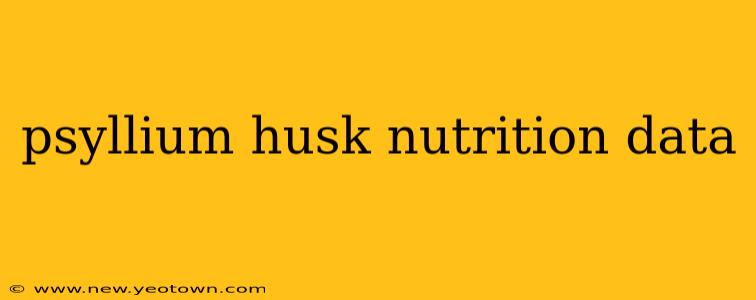Psyllium husk. The name might sound a little exotic, but this humble ingredient, derived from the seeds of the Plantago ovata plant, is a nutritional powerhouse quietly revolutionizing digestive health. Its fame isn’t unfounded; psyllium husk is a champion of soluble fiber, offering a wealth of benefits that extend far beyond simple regularity. But what exactly is in this amazing fiber? Let's unravel the nutritional data and uncover the secrets behind its effectiveness.
What is the Nutritional Value of Psyllium Husk?
A typical serving of psyllium husk (around 1 tablespoon or 7 grams) boasts an impressive nutritional profile, though it's relatively low in calories. Instead of focusing on macronutrients like protein or fat, the real star here is fiber – specifically, soluble fiber. This type of fiber absorbs water, forming a gel-like substance in your digestive tract. This gel is what contributes to psyllium husk's many health benefits. Let's break it down:
-
Fiber: This is where psyllium husk truly shines. A single serving provides roughly 3-4 grams of fiber, a significant portion of the recommended daily intake. The majority of this fiber is soluble, making it particularly effective for digestive regularity and blood sugar control.
-
Calories: Low in calories, a typical serving contains only about 10-20 calories. This makes it a perfect addition to a weight management plan.
-
Other Nutrients: Psyllium husk also contains trace amounts of other nutrients, including potassium and some vitamins, but these are not usually significant contributors to your daily nutritional needs.
How Does Psyllium Husk Affect Blood Sugar?
Does psyllium husk help lower blood sugar? Yes, many studies suggest that psyllium husk can help regulate blood sugar levels. The soluble fiber in psyllium husk slows down the absorption of glucose into the bloodstream, preventing those sharp spikes in blood sugar after meals. This effect makes it a beneficial addition to the diets of individuals with type 2 diabetes or those at risk of developing the condition. Remember to always consult with your doctor before making significant dietary changes, especially if you are managing a health condition.
Is Psyllium Husk Good for Weight Loss?
Can psyllium husk help with weight loss? While psyllium husk isn't a magic bullet for weight loss, it can contribute to a successful weight management plan. Its high fiber content promotes satiety, meaning you feel fuller for longer. This can help reduce overall calorie intake. Furthermore, the fiber absorbs water in the digestive system, potentially aiding in bowel regularity and reducing bloating. It’s important to remember that psyllium husk is most effective as part of a balanced diet and exercise program.
What are the Potential Side Effects of Psyllium Husk?
What are the side effects of taking psyllium husk? While generally safe, psyllium husk can cause some side effects, particularly if not consumed properly. Always take psyllium husk with plenty of water. Failing to do so can lead to constipation rather than relief, or even blockages in the esophagus or intestines. Other potential side effects include gas, bloating, and diarrhea. Starting with a small amount and gradually increasing your intake can help minimize these issues. If you experience persistent or severe side effects, stop taking psyllium husk and consult your doctor.
How Much Psyllium Husk Should I Take Daily?
What is the recommended dosage of psyllium husk? The recommended dosage of psyllium husk varies depending on your individual needs and health goals. Always follow the instructions on the product label. It's generally advisable to start with a smaller dose and gradually increase it as tolerated. It's crucial to drink plenty of water with each serving to ensure proper hydration and prevent potential side effects. Consult with your doctor or a registered dietitian to determine the appropriate dosage for your specific circumstances.
Psyllium husk, with its impressive fiber content and associated health benefits, is a valuable addition to a healthy diet. However, remember that a balanced lifestyle, including regular exercise and a varied diet, remains crucial for overall well-being. Always consult with a healthcare professional before incorporating any new supplement into your routine, especially if you have pre-existing health conditions.

